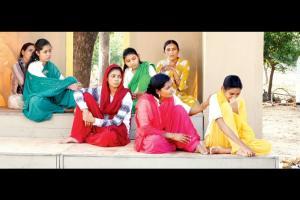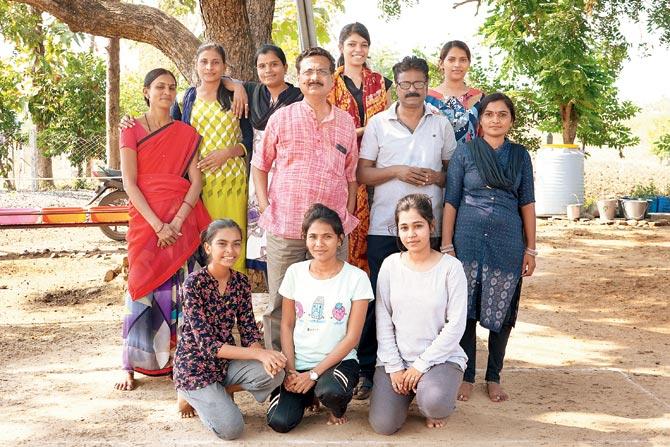The Marathi play Terav, enacted by farm widows themselves, is a window into their gut-wrenching experiences following their husbands' deaths

Some of the farm widows during the rehearsals of Terav
 Screaming politicians and activists demanding solutions to the agrarian crisis that has killed thousands of hapless farmers across Maharashtra are par for the course during election time. But, have we ever stopped to wonder what happens to the wives and children of these farmers?
Screaming politicians and activists demanding solutions to the agrarian crisis that has killed thousands of hapless farmers across Maharashtra are par for the course during election time. But, have we ever stopped to wonder what happens to the wives and children of these farmers?
After the men have given up the fight over crop failure because of drought and changed weather conditions, over the resultant debt and harassment at the hands of banks and private money lenders, over the failure of successive governments in resolving the crisis, their families' world collapses.
ADVERTISEMENT
The hardest hit are the widows, who suffer mentally, socially and physically. Some perish under social and economic pressure, and stop putting up a fight against the odds – which are sometimes their own families. But, there are also some shining examples. Some inspiring widows have not only risen like the phoenix from the ashes of their husbands' funeral pyres, but have also ensured the right to live with dignity, and are supporting their children through hard work.
The time has come for them to take centre stage, thanks to a group of sensitive journalists, teachers and artistes from Vidarbha. And, they are all telling their own stories

The cast with playwright Shyam Pethkar and director Harish Ethape
My struggle, my story
Come December 15, Nagpur's modest Sai Sabhagriha will host a play featuring five farm widows and their children. The resilient widows will themselves narrate the struggle that has led them to a renaissance in their shattered lives. The play is aptly titled 'Terav' (13th day after the death).
The brains behind the unusual idea, playwright and editor of Marathi daily Tarun Bharat, Shyam Pethkar, and school teacher-turned theatre director, Harish Ethape, say they started working for farm widows many years ago, and spend every Diwali with them. Last Diwali, they popped an uncomfortable question to the widows. "What would you have told your husband if he had met you just before ending his life? And what would you tell him if he appeared before you now?
"Their responses were gut-wrenching. They spoke as if there was no tomorrow. The widows were forced into the role of both woman and man. Their stories gave us the idea," said Pethkar. Ethape, who never stops experimenting, had by then founded a group Agro Theatre, based at his 12-acre farm near Wardha.
They then asked the widows if they would act. While asking the question was awkward, the response was extremely encouraging, says Pethkar. Ethape took over even as Pethkar worked on the script. This Diwali, 20 widows from Wardha, Yavatmal and Amravati were called in to train in the basics of acting at Agro Theatre. Of these, five, along with some kids, made the cut. The theatre group members stood in as supporting cast. The rehearsals were so successful that the widows refused to go home for Akshaya Tritiya for the puja of departed family members, including their late husbands.
To make them theatre-friendly, a select cast along with the theatre group members presented 'Terav' at a state-level competition at Chandrapur last month. The fairly successful staging gave producers Adhyayan Bharati, an NGO from Wardha, the confidence to take the play to a bigger audience in Nagpur.
Rebellion and victory
Most of the widows' families opposed the idea of them, especially the younger women, performing on stage. But, the women were adamant. They even took their children along. For, they knew the drama was all about the will to be independent.
The irony was that the in-laws of these women, who had eaten into the compensation and other benefits that were rightfully the widows', opposed the idea of their participation despite forcing them out of the marital homes years back. The protagonists of the play did not mince words while describing the tyrannical in-laws and extended families.
Hailing from Kalamb in Yavatmal district, Vaishali Yede, 28, says she left her late husband's home much before joining Agro Theatre. "I was 19 when I got married into a family of 14 people. We all worked on the farm, but my husband killed himself over mounting debts in 2011. I had a 5-year-old son and was pregnant again when we lost him. I was then reduced to a domestic help. I was not allowed to go out. I feared his family more than outsiders," she adds. When Vaishali protested, the family forced her out. She came to Wardha where Ekal Mahila Sanghtna helped her get back on her feet. "I sew clothes and work as a labourer to support my kids," she says.
Manda Alone's husband killed himself in 2013. She had two kids then. She, too, was told to leave home by her in-laws. Naam Foundation helped her find work. Talegaon Thakur's Madhuri Chitkule wasn't given the right to her husband's farmland after his suicide. Kavita Dhoble was packed off in similar fashion.
One of the participants who was stopped from performing, says her in-laws were well-off, but she was subjected to the life of a destitute. "I was forced to work as a labourer on the farm my late husband owned. They were so cruel that I left their home and gave up any right to my husband's legacy," she says.
What the widows rue is the ill-treatment. "Society objects to our public presence. There are aspersions cast even when we are seen with our real brothers. We are easy prey for men who cross our paths," said another participant. Pethkar and Ethape say the drama isn't a commercial venture. "It should be seen as a theatre form of activism that we have shaped together. Our activism demands farm widows' right to live with dignity. The participation of the victims makes our effort even more sensitive."
The duo promises to stage shows in Mumbai and Delhi where they expect opinion makers and the powers that be to have first-hand experience of the war that the widows have waged against all odds.
Dharmendra Jore is political editor, mid-day. He tweets @dharmendrajore Send your feedback to mailbag@mid-day.com
Catch up on all the latest Mumbai news, crime news, current affairs, and also a complete guide on Mumbai from food to things to do and events across the city here. Also download the new mid-day Android and iOS apps to get latest updates
 Subscribe today by clicking the link and stay updated with the latest news!" Click here!
Subscribe today by clicking the link and stay updated with the latest news!" Click here!







